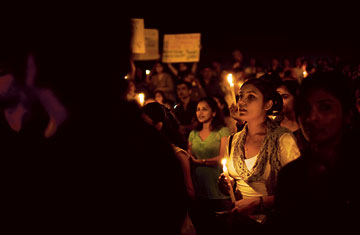
Remembering the dead and injured: A candlelight vigil in Mumbai on Nov. 30, the day after the city's nightmare ended
(3 of 3)
It would be a mistake, however, to interpret the financial world's sanguine reaction to such a serious attack on India's financial and commercial capital as a sign of great hope for India's future. Business comes to India simply because it can't ignore a billion-strong consumer market with an economy growing at 7% a year even in a global recession. But investors have come to realize, as anyone who lives in India has, that the rising superpower once touted at the World Economic Forum in Davos, Switzerland, as "Incredible India" has been oversold. Some of its strengths, left unmanaged, turn into weaknesses. India's rapid urbanization, for example, is energizing its cities by bringing new aspirations and new consumers from rural to urban areas. But these migrants are also taxing the infrastructure. India might have more billionaires on the Forbes 400 than ever before, but 80% of its population still lives on less than $2 a day. Public schools are ineffective: 40% of enrolled 8- to 11-year-olds cannot read a page. More than 440 million Indians, 40% of the population, are under 18, and it is not clear how India will generate enough jobs over the next two decades to employ them. Facing those hard realities, the global corporate world has begun to see terrorism the way many Indians do — as one of those utterly shocking and yet immovable problems, such as child labor, unsafe drinking water and filthy streets, that become part of the background of living and working in India.
For all the drama and pathos, it is possible to imagine the Mumbai attacks receding into the background because that has already happened for so many of India's other violent conflicts. Since the July 2006 bombing of a Mumbai commuter train, which killed 184 people, there have been nine other blasts in major Indian cities, killing 300 more. Naxalites, the Maoist insurgents who have made claims on a wide patch of central India, have clashed repeatedly with police and paramilitary forces, killing at least 175 this year, according to the South Asia Terrorism Portal. In Orissa, anti-Christian violence has claimed the lives of at least 50 people and turned thousands more into refugees. Officials and analysts are correct to call the Mumbai attack a threat to the idea of India as an open, secular, multifaith democracy. But it is hardly the only one. For separatists and other militant groups throughout India, Mishra says, "this idea of India is fatally compromised."
The Culture Gap
There are two phrases that anyone moving to one of India's Hindi-speaking big cities quickly learns. The first is, "Chalta hai." Literally: "It goes." Figuratively: "It works well enough, so why bother?" The second is "jugaar," referring to the web of favors and imperfect, improvised, less-than-legal solutions through which most things in India still get done. Taken together, these two cultural touchstones are the biggest reasons why India has not yet found the political will to address its deepest problems. "Chalta hai," Indians say about everything from traffic to political corruption to substandard education — that this is the best that a poor country of 1 billion people can do. And when any of those problems affect you, with a well-placed favor and a willingness to look the other way, there's always a solution.
It is worth remembering, though, that India has overcome this culture before. When a few bureaucrats and economists pushed through the 1991 economic reforms, no one thought the "license Raj" would ever fall. At the time, the political decisions behind the reforms were unpopular, and its possibilities were not yet apparent. A few prominent businessmen formed a group — the Bombay Club — to oppose the reforms, surely unaware that they would one day be among their biggest beneficiaries. As incomplete as those reforms have been, they have brought India into its new place in the world. The attacks were an acknowledgement of that. The targets chosen were not just Mumbai landmarks but symbols of India's deepening connections to the global economy.
The answer to the challenge of tackling the inertia that still afflicts India is not obvious. Those who attacked Mumbai did so not with clear demands or ideology, but with simply a desire to tilt India's troubled state toward violence and conflict. Tightened security and better intelligence are important, but they cannot replace political solutions in Kashmir and Gujarat. Shows of unity and strength won't erase the pervasive culture of corruption in public service. There are no guarantees of the real change Mumbai is clamoring for, but, says Guha, "it's more likely now than at any time in the past." And it has already begun. It's there in the frankness of tycoon Ratan Tata's comments about his beloved Taj, acknowledging the "woefully poor" response of the police, and the three hours that passed before the fire engines arrived. It's there in the families of the dead police officers who rebuffed the grandstanding condolences of politicians. And it was there on the streets of Mumbai, too. On the morning after the morning after, the vegetable sellers came out in the badly hit Colaba district. All the other shops were still closed, but these men and women stacked up their tomatoes and eggplants, breathing that first bit of life back into the city. The siege was far from finished, and they couldn't know what that new day would bring, but they were there to be part of it.
— with reporting by Madhur Singh/Mumbai
